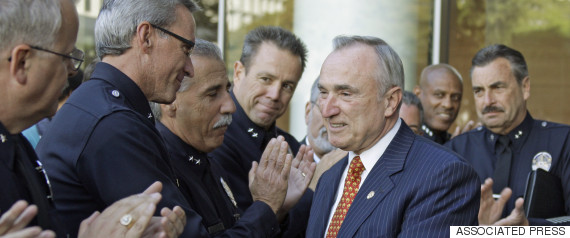From 1988 to 1998 -- known to some as the “decade of death” -- close to a thousand people per year were killed in Los Angeles. Gangs didn’t run all the neighborhoods, but the ones they did, they terrorized. Drugs moved openly on street corners, drive-by shootings occurred with dispiriting frequency, and wearing the wrong color T-shirt on the wrong street could be interpreted as a death wish.
It all seems improbable now. There are still terrible parts of the city, where brutality and blight reign, but to say that LA is a city unchanged is to ignore the statistics. From 2008 to 2012, violent crime across the nation went down about 16 percent, according to a recent cover story on the subject for Pacific Standard magazine. But in Los Angeles that drop was notably more precipitous in gang areas, the magazine notes: 30 percent in Compton, 50 percent in Bell Gardens and 50 percent in El Monte. Gang-related homicides in Los Angeles have gone down 66.7 percent over the past eight years, and gang-related crimes have seen a 55.3 percent dip since 2005.
So, what accounts for this drastic decline? The only thing that everyone -- from police representatives to community organizers to Sam Quinones, the author of the Pacific Standard piece -- can agree on is that there’s no single answer. But if you consider the six theories below, and how they interact and build on each other, you can begin to see why city officials say Los Angeles hasn’t been this safe since the Eisenhower administration.
1. More police, smarter policing.

When New York City’s current police chief, William J. Bratton, took over the Los Angeles Police Department in 2002, he quickly added 1,000 new cops. But they weren’t brought on merely to bust heads. As Pacific Standard noted, the department's new mantra became: "We can't arrest our way out of the problem."
Bratton strongly encouraged cops to get involved in the lives of the people they were policing, even tying officers' career advancement to their success in community outreach. The result was that division commanders became community problem-solvers, lobbying on behalf of residents for city services such as pothole repair and tree trimming.
The other thing Bratton brought in besides a change of attitude and more boots on the ground was CompStat -- a program that offers real-time statistical monitoring of criminal activity. CompStat has helped shift commanders figure out where to deploy resources. It has also allowed higher-ups to monitor the effectiveness of individual division captains in reducing criminal activity.
Too funny. Mike cites an article from the Huffington Post (obviously a strong proponent for gun control) listing six reasons for LA’s drop in crime- none of which even hint about gun control. And what labels does Mike use? “gun control” and “proper comparison”.
ReplyDeleteGun control being the missing element would be a good reason to tag it thus, no? Proper comparison was about comparing LA today to the LA of some years ago, rather than different states or countries.
DeleteI don't know why you found that so difficult to follow.
If you cant arrest your way out of the problem why exactly do half of the theories listed involve arresting people?
ReplyDeleteCrime is probably down because most of the criminals are in jail.
ReplyDeleteI'm with Shelly. The highest incarceration rate in the world has to have an effect on the crime rate.
DeleteExcellent points, both of you, TS and SSG.
ReplyDeleteWell, ss had a good one anyway. Loyalty to your kind, regardless of anything, that's your thing, huh, Kurt?
DeleteWell, ss had a good one anyway.
DeleteIndeed (although I still prefer my "excellent" to your "good"), as did TS.
Loyalty to your kind, regardless of anything, that's your thing, huh, Kurt?
And what, pray tell, is my "kind"? Regardless, sure--I view loyalty as important, and therefore, I suppose, "my thing" (well, one of my "thing[s]," alongside integrity, honor, logic, morality). In this case, loyalty doesn't really enter into the equation, because logic and integrity are quite sufficient to perceive and acknowledge the incisiveness of TS's point.
"And what, pray tell, is my "kind"? "
DeleteFake question - feigned ignorance - lie.